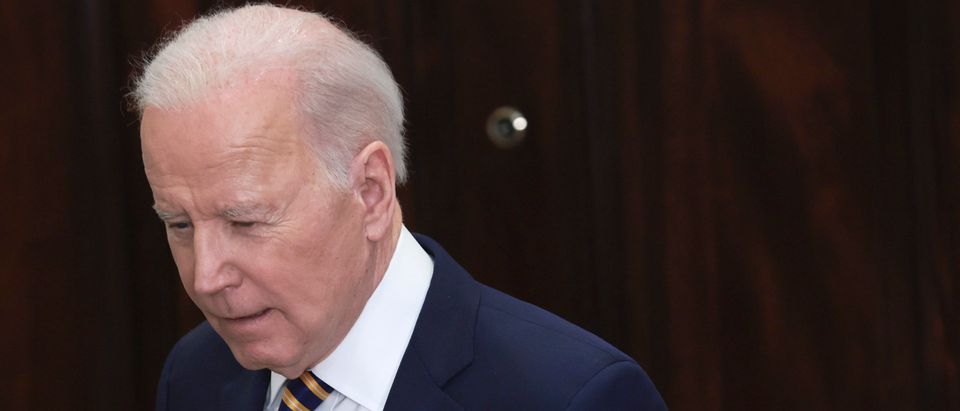President Joe Biden ran as the tough-on-Russia candidate, but Americans want him to do more to curb Moscow’s warmongering forays into eastern Europe.
Multiple recent polls conducted since Russian President Vladimir Putin invaded Ukraine show a majority of Americans think Biden needs to be tougher on his Russian counterpart. Biden responded to some of that political pressure Tuesday when he announced that the United States would no longer be purchasing Russian oil and gas.
A Quinnipiac poll released Monday found that 56% of respondents said that the steps taken by Biden so far to punish Russia for invading Ukraine were not strong enough, with only 30% saying they were sufficient. In the same poll, Americans approved of banning the import of Russian energy by a margin of 71%-22%, even if it leads to higher gas prices.
That’s just the move Biden announced Tuesday, the same day that gas prices reached an all-time record high of $4.14, according to AAA, surpassing levels hit during the 2008-2009 financial crisis. Nearly 10% of America’s imported energy comes from Russia, meaning prices could continue to rise due to the ban.
A separate poll taken by The Economist and YouGov between Feb. 26 and March 1 found that only 11% of Americans would not impose additional sanctions on Russia. 40% said they supported more sanctions even if it resulted in higher gas prices. 49% of Americans said the government’s response to Russia should be tougher, compared to only 28% who said it was about right or should be softer.
Biden was delayed in taking some actions that Americans broadly approved of, such as sanctioning Putin directly. According to multiple reports, the White House also stepped in to nix a bipartisan plan in Congress to ban the import of Russian energy, in order to not be seen as leading from behind on the issue. (RELATED: Biden Says He ‘Can’t Do Much Right Now’ About Rising Gas Prices)
Members from both parties expressed frustration that they spent the whole weekend working in a bipartisan fashion only to get rolled by the WH.
**and as I type this, Reuters reports a WH announcement to ban Russian oil is imminent.
— Jacqui Heinrich (@JacquiHeinrich) March 8, 2022
A CBS poll released March 1 found that Biden’s approval rating on the Ukraine crisis is heavily underwater with independents. On the whole, only 41% of Americans approved of how he’s handled the situation. Predictably, Democrats approved 71%-29% and Republicans disapproved 83%-17%. But among independents, only 35% approved and 65% disapproved.
On the campaign trail, Biden positioned himself as the choice that would be harder on Russia and Putin after Democrats for years accused former President Donald Trump of colluding with the Russian government to advance his own personal interests. Biden tweeted in Feb. 2020 that Putin “doesn’t want me to be President.”
Vladimir Putin doesn’t want me to be President. He doesn’t want me to be our nominee. If you’re wondering why — it’s because I’m the only person in this field who’s ever gone toe-to-toe with him.
— Joe Biden (@JoeBiden) February 21, 2020
Biden’s economic sanctions have done significant financial harm to Russia. The Russian stock market has been closed for a week and a half and counting, and the value of the ruble has plummeted more than 40% in the past month.
More hawkish options remain available to Biden, and the next one the White House and its NATO allies may consider is the institution of a no-fly zone over Ukrainian airspace. Initially dismissed by many pundits, calls for such a policy have grown louder from defense experts and American politicians in recent days. Ukrainian President Volodymyr Zelenskyy has repeatedly asked the west to secure Ukrainian airspace.
White House Press Secretary Jen Psaki has consistently reiterated that a no-fly zone would be a bad idea. Such a policy would require NATO aircraft to shoot down Russian planes in the event they fly over Ukraine, potentially leading to a wider, more destructive conflict between Moscow, Washington and Europe. (RELATED: Poll: Republicans And Independents Would Defend America If Invaded — Dems Say They Would Flee)
But the American people are coming around to the idea that the Biden team is hesitant to broach. A new Reuters-IPSOS poll released Friday found that 74% of Americans supported instituting a no-fly zone enforced by NATO over Ukraine. Majorities of both Republicans and Democrats were in favor of the policy. The question’s wording did not fully explain the possible implications of the policy.
Thus far, the war in Ukraine has claimed thousands of lives between the two sides, including many civilians. Most of the world has united in condemnation and sanctioning of Russia, but Putin has continued to justify the war on “denazification” grounds as he cracks down on domestic liberties in his own country.












